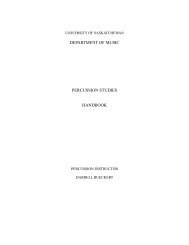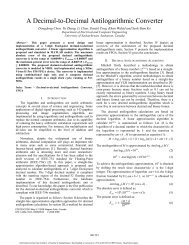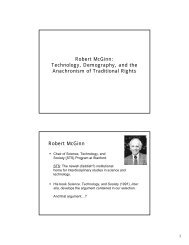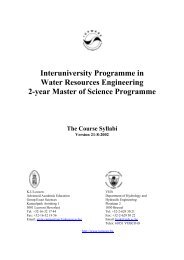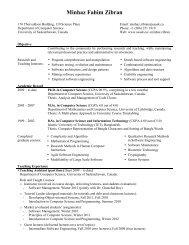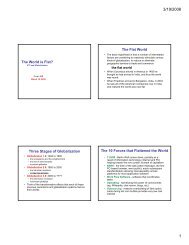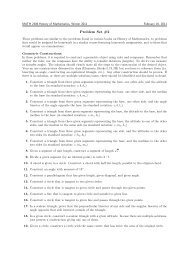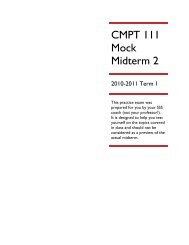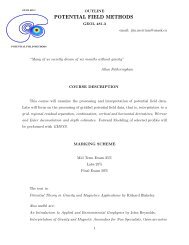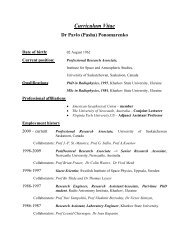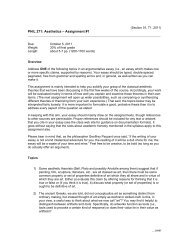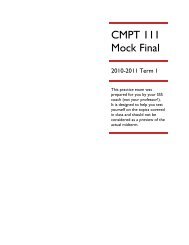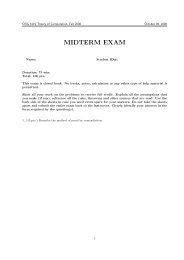Harrius Potter notes
Harrius Potter notes
Harrius Potter notes
Create successful ePaper yourself
Turn your PDF publications into a flip-book with our unique Google optimized e-Paper software.
<strong>Harrius</strong> <strong>Potter</strong> et Philosophi Lapis<br />
by J.K. Rowling (P. Needham, tr.)<br />
Notes on Chapter 1<br />
[RL = Jones and Sidwell, Reading Latin, vol. 2: cited by grammar sections]<br />
This document is still subject to correction and revision.<br />
Any comments, suggestions, or corrections would be more than welcome.<br />
You can contact me at: john.porter@usask.ca<br />
N.B. — in what follows it is assumed that the reader is familiar with the basic principles<br />
governing the sequence of tenses in Latin: see further<br />
http://homepage.usask.ca/~jrp638/latin/RLsheets/5Asequence.pdf.<br />
You should also own a standard intermediate classical Latin dictionary:<br />
in deciding what points require comment, I have used<br />
D.P. Simpson, Cassell's Latin Dictionary [ISBN: 0025225804]<br />
© John R. Porter, 2006<br />
Not to be reproduced without permission.<br />
A Note on Peter Needham’s Translation<br />
In any undertaking of this size, it is inevitable that there be places where others either fail to<br />
understand one’s choices or disagree with them — and that there be some outright mistakes (as is no<br />
doubt the case with the <strong>notes</strong> that follow below). That being said, Peter Needham’s translation sets a<br />
remarkably high standard for such a work: his Latin consistently captures both the sense and the tone<br />
of Rowling’s novel with a grace and wit that are exemplary. In producing this translation of Harry<br />
<strong>Potter</strong> and the Philosopher’s Stone, Mr. Needham has not only provided an interesting window into<br />
the strengths and weaknesses of the Latin language — since it is unheard of for students to have the<br />
opportunity, on such an extended scale, to consider how Latin might deal with the idioms of colloquial<br />
English — but has also furnished beginning students of the language with a superb text on which to<br />
hone their skills, one that is at once both challenging and superbly entertaining. Those who teach Latin,<br />
and those who simply love the language, owe him an immense debt.<br />
On the whole, the translation follows the Neo-Latin tradition of relying on cognates to convey the<br />
sense of a passage rather than attempting to adapt the original in terms that would have been readily<br />
understandable to a reader in the classical period. Thus, e.g., on the bottom of p. 2 Mr. Dursley begins<br />
to think of the “client” (cliens) who he hopes will place an important order that day (vs., e.g., emptor).<br />
Similarly, earlier on that same page Mr. Dursley leaves the house octava hora et dimidia: 8:30 in the<br />
morning, by the modern reckoning, but rather late in the afternoon for a reader in the classical period.<br />
Such an approach — which treats Latin as a living modern language rather than mooring it in the<br />
traditions of the classical past — is legitimate and has the advantage of making the text much easier for<br />
the modern reader to translate (esp. if he/she is making use of what for once is an utterly authoritative<br />
English crib!). An interesting contrast is provided by Andrew Wilson’s translation of this same text<br />
into Attic Greek, where (lacking the well-established traditions of Neo-Latin) the translator has more<br />
often elected to interpret the significance of the original text and recast it into terms that, in this<br />
particular case, a reader of the second century AD could appreciate.
TITLE: As many have noted, the translation “philosophi lapis” accurately reflects Rowling’s<br />
title (which has a possessive that is singular in form) but does not take into account the<br />
original Latin phrase represented by that English expression, which would have had the<br />
plural philosophorum. (Rowling’s version seems to reflect a certain laxness in early English<br />
regarding the position of the apostrophe.) Perhaps better: De Harrio <strong>Potter</strong>o lapideque<br />
philosophorum (although this is clearly much more unwieldy and was likely avoided for that<br />
very reason).<br />
1.1: Dursley — the Dursleys’ name is indeclinable in the singular; in the pl. it is Durslei,<br />
Dursleorum (2m.)<br />
1.1: gestatio, -onis (3f.) — a place made for riding on horseback or for being conveyed along<br />
by means of a litter or some other vehicle; a drive, walk<br />
1.1-2: in aedibus … signatis<br />
1.2: numero quattuor — instrumental abl. (RL 84)<br />
1.3: se … uti — acc. + inf. in ind. discourse / oratio obliqua (RL 98)<br />
1.3: ratione ordinaria — instrumental abl. with utor (RL 100B4)<br />
1.3: vivendi — a gerund (a neuter abstract verbal noun [related in form to the participle],<br />
usually translated in Engl. by “-ing”: see RL 175 and the fuller discussion at<br />
http://homepage.usask.ca/~jrp638/latin/RLsheets/5Dgerundive.pdf) in the gen. sg. — ratio vivendi =<br />
“method of living,” “lifestyle”<br />
1.3: uti
1.10: quam — “than,” “as” (comparative adv. — introduced by alterum tantum)<br />
1.10: quod — rel. pronoun: the antecedent is collum<br />
1.11: magno ei usui — magno usui and ei represent the double dat. construction (RL 88.6)<br />
1.11: quod — “because”<br />
1.12: porrigendo — a gerundive (a verbal adjective [neut. abl. sg.] — see RL 161 and, further,<br />
http://homepage.usask.ca/~jrp638/latin/RLsheets/5Dgerundive.pdf); in collo … porrigendo means “in<br />
stretching her neck”<br />
1.13: nomine — cf. 1.7<br />
1.13: Dudley — Dudley, Dudlei (2m.)<br />
1.14: sententia — abl. of respect (RL 147) or phps. abl. of standard: eorum sententia = “in<br />
their opinion”<br />
1.16-17: timebant ne … cognosceret — in this passage, ne introduces a clause of fearing (“they<br />
were afraid lest …”), which works rather like an indirect command (RL 134) except that ne<br />
introduces a positive fear (something you’re afraid will happen), while ut (or ne … non)<br />
introduces a negative fear (something you’re afraid won’t happen): see RL 162. The subj. is<br />
impf. because we are in secondary sequence.<br />
1.16: quis = aliquis (after ne)<br />
1.17: id fore — acc. + inf. in ind. discourse / oratio obliqua (RL 98) (Id is in apposition to<br />
si ….)<br />
1.17: quis = aliquis (after si)<br />
1.17: <strong>Potter</strong>is — the name <strong>Potter</strong> declines like puer<br />
1.17-18: si … fieret — a subordinate (conditional) clause reported in secondary sequence as<br />
part of indirect discourse (RL 142). [Conditions reported in indirect discourse in Latin tend<br />
to blend together and can be tricky to decipher: see Gildersleeve and Lodge, Latin Grammar<br />
656; Woodcock, A New Latin Syntax 280. What the Dursleys probably thought was, “si quis<br />
certior fiat, intolerabile sit” (a fut. less vivid condition: RL 139) — “if (ever) anyone were<br />
to find out, it would be unbearable.” When reported in ind. discourse in secondary sequence,<br />
the pres. subj. of the main clause is represented as a fut. inf., that of the protasis as an impf.<br />
subj. Contrast, e.g., the indicative erant at 1.21.]<br />
1.18: certior fieret — certior fieri is the passive equivalent of certiorem facere aliquem (“to<br />
inform someone”)<br />
1.19: aliquot … annos — acc. of extent of time (RL 71)<br />
1.19: re vera — “in truth,” “in (actual) fact” (abl. of respect: RL 147)<br />
1.20: se non habere — acc. + inf. in ind. discourse / oratio obliqua (RL 98)<br />
1.21: erant — given the implied indirect discourse (suggested by nefarius), one might have<br />
expected essent here (subordinate [explanatory] clause in indirect discourse, in secondary<br />
sequence — RL 142)<br />
1.21: omnibus modis — abl. of manner (RL 100B3)<br />
1.22: rati
1.22: quid dicturi essent — an indirect (i.e., reported) question in secondary sequence that<br />
requires the subj. (RL 172 — following much the same logic as the use of the subj. in<br />
subordinate clauses in indirect discourse: RL 142). In this case, to indicate what would have<br />
originally been a question involving a fut. ind., the so-called “fut. subj.” is required (RL 142<br />
n. and see, further, the conclusion of the discussion at<br />
http://homepage.usask.ca/~jrp638/latin/RLsheets/5Asequence.pdf). See further, next n.<br />
1.23: si … advenirent — a subordinate (conditional) clause reported in secondary sequence as<br />
part of indirect discourse (RL 142) [cf. on 1.17-18]. What the Dursleys probably thought<br />
was: quid finitimi dicent, si <strong>Potter</strong>i advenient? (“What will the neighbors say if the <strong>Potter</strong>s<br />
come?”)<br />
1.23-24: <strong>Potter</strong>os … habere — acc. + inf. in ind. discourse / oratio obliqua (RL 98)<br />
1.24: ne … quidem — “not even” (regularly surrounds the term being emphasized)<br />
1.25: cur … arcerent — indirect question (RL 172) in secondary sequence<br />
1.27: experrecti
in place of the pres. participle<br />
2.14: autocinetum — a neut. sg. adj. derived from the Greek for “self-moving” (understand<br />
vehiculum)<br />
2.14-15: gestatione — see on 1.1<br />
2.15: numeri quattuor — possessive gen. (“of [house] number four”)<br />
2.16: angulo viae — “corner of the street,” “intersection”<br />
2.17: secundum — “a second,” “a moment” [cf. 4.15] (2m. — a non-classical usage) [One<br />
might have expected the neut. to be used in this sense.]<br />
2.18: quid vidisset — an indirect (i.e., reported) question (RL 172) in secondary sequence<br />
2.18: subito motu — abl. of instrument (RL 84) or manner (RL 100B3)<br />
2.19: ut … inspiceret — purpose / final clause (RL 145) in secondary sequence<br />
2.19: feles maculosa — [Some of the cat-lovers in our group protested against this translation<br />
for “tabby cat,” but it is difficult to think of an appropriate adjective: virgata?]<br />
2.21: quidnam
translate: “he couldn’t help but notice” (lit: “he could not act (in a way) how he could not<br />
notice”) Secondary sequence.<br />
2.34: multos adesse homines — acc. + inf. in ind. discourse / oratio obliqua (RL 98)<br />
2.35: novis … vestibus — instrumental abl. (RL 84)<br />
2.35: homines palliatos — a sentence fragment, in apposition to multos homines<br />
2.36: ridiculis … vestibus — cf. 2.35 (novis … vestibus)<br />
2.36: eius modi — gen. of description (RL 101) (see further, next n.)<br />
2.36: quas — exclamatory use of the interrogative adj. (understand vestis): “what clothes of<br />
that sort …”<br />
2.37: id esse — acc. + inf. in ind. discourse / oratio obliqua (RL 98)<br />
2.37: novi et stulti — partitive genitives (abstract neuters) with aliquid (cf. RL reference<br />
grammar L(d)2)<br />
2.38: digitis — abl. of instrument (RL 84)<br />
2.38: oculis — abl. of instrument (RL 84)<br />
2.38: discernit — a vivid pres. tense<br />
3.1: commoti — (
3.11: tergo … adverso — abl. absolute (RL 109)<br />
3.11: fenestrae — dat. with cmpd. vb. adverto<br />
3.11: quodnisi — “but if not” (quod [conj.] + nisi). [This reading leaves fecisset without a<br />
stated object. Better quod nisi, with quod the neut. acc. sg. connecting relative pronoun (RL<br />
107) taking as its antecedent the statement semper sedebat … adverso. Tr. “Which thing, had<br />
he not done it …” — i.e., “Had he not done this …”]<br />
3.11-12: quodnisi fecisset … fuisset — past contrary-to-fact condition (RL 173)<br />
3.11: mane — adv. (“in/on the morning”)<br />
3.12: difficilius — modifying intendere, which is the acc. subject of fuisset<br />
3.13: clara luce — abl. of time (RL 67: lux = “broad daylight”)<br />
3.13: praetervolitantes
3.29: auribus — abl. of instrument (RL 84)<br />
3.32: timore — causal abl. (RL 108.2)<br />
3.33: quasi … vellet — an unreal comparison in secondary sequence introduced by quasi: see<br />
RL 179.3<br />
3.36: voce irata — abl. of manner (RL 100B3)<br />
3.36: inquietare — veto takes an acc. + inf. (cf. iubeo) rather than an indirect command /<br />
jussive noun clause (RL 134)<br />
3.37-38: cum … mutavit — note the use of cum with the indicative: see RL reference grammar<br />
T(e)<br />
3.38: mulsit
4.7: sororis — objective gen. with mentio (RL reference grammar L(d)6)<br />
4.7-8: si … habuisset — a past contrary-to-fact condition (RL 173). This reads a bit oddly —<br />
one would have expected a present contrary-to-fact condition (RL 139) in the context of<br />
Dursley’s interior monologue — but it accurately reflects the language of the original.<br />
4.8-9: palliatos illos — acc. + inf. in ind. discourse / oratio obliqua (RL 98), but no inf. is<br />
supplied, as Dursely’s thoughts drift off<br />
4.10: pomeridiano tempore — abl. of time (RL 67)<br />
4.10: multo — abl. of degree of difference (RL 100B5)<br />
4.10: difficilius — modifies intendere, which is the acc. subj. of erat<br />
4.10: terebris — dat. with compound verb intendere<br />
4.11: quinta hora — abl. of time (RL 67)<br />
4.11: discederet — impf. subj. in cum-clause (RL 124) in secondary sequence<br />
4.12: ut … incesserit — result / consecutive clause (RL 144), with the pfct. subjunctive (RL<br />
167) in secondary sequence (an exceptional usage: see, e.g., Gildersleeve and Lodge, Latin<br />
Grammar 513 s.v. “Perfect Tense (Aorist)” and cf., e.g., Furneaux on Tacitus, Annales<br />
1.80.4)<br />
4.12-13: in aliquem … stantem<br />
4.14-15: cum … lapsus est et … cecidit — note the use of cum with the indicative: see RL<br />
reference grammar T(e)<br />
4.15: secundi — see on 2.17<br />
4.15: priusquam — RL 165.3<br />
4.17: quod — “with regard to the fact that,” “that”<br />
4.18: rictum diduxit — “opened his mouth wide” (to laugh or smile) [Here the acc. object<br />
rictum anticipates the effect of the action (“He opened (his mouth) so as to create a rictus”)<br />
— sometimes referred to as either an acc. of result or as a pregnant use of the object.]<br />
4.18: voce stridula — cf. 3.36<br />
4.19: quae — (antecedent: vox)<br />
4.19: convertit — “attracted,” “drew”<br />
4.19: praetereuntium — substantival use of the pres. participle (RL 136: “passers-by”)<br />
4.19-20: paenitentiae — gen. or dat. with locus<br />
4.21: Quidam — “You-Know-Who”<br />
4.22: Muggles — sg. Muggle (a 3 rd decl. m.f. noun)<br />
4.22: tui — note the use of the gen. of tu (relatively infrequent, and only in the most particular<br />
circumstances to indicate possession): here it depends on similes.<br />
4.24: solo — dat. with defigo (solum [2n.])<br />
4.25: se appellatum esse — acc. + inf. in ind. discourse / oratio obliqua (RL 98)<br />
4.26: autocinetum — see on 2.14<br />
9
4.27: se … fingere — acc. + inf. in ind. discourse / oratio obliqua (RL 98). (Contrast the<br />
construction with spero at 2.30-31.)<br />
4.27: animo — cf. 2.21<br />
4.27: quod — relative pronoun, neut. acc. sg. (“a thing that”: with se … fingere as the<br />
antecedent)<br />
4.28: quod — “because”<br />
4.28: animo — cf. 2.21<br />
4.30: ubi primum — “as soon as”<br />
4.30: gestationem — cf. 1.1<br />
4.30: numeri quattuor — cf. on 2.15<br />
4.31: maculosam — see on 2.19<br />
4.31: quod — relative pronoun, neut. acc. sg. (“a thing that”: with vidit … conspexerat as the<br />
antecedent)<br />
4.23: in melius — “to/for the better”<br />
4.33: quin … esset — see on 2.34. Translate: “He had no doubt but that it was the same one.”<br />
Secondary sequence.<br />
4.34: voce magna — cf. 3.36<br />
4.35: modo — “only,” “just” (adv.)<br />
4.35: oculis torvis — abl. of instrument (RL 84)<br />
4.36: an … essent — an indirect (i.e., reported) question (RL 172) in secondary sequence,<br />
introduced by an (“whether”). On this use of an, see RL 172 n.1<br />
4.37: conatus — note the idiomatic circumstantial (RL 77) use of the pfct. deponent participle<br />
in place of the pres. participle<br />
4.38: nihil … dicere — noun clause (the object of habebat)<br />
5.1: solito more — abl. of manner (RL 100B3)<br />
5.2: quam … esset — an indirect (i.e., reported) question (RL 172) in secondary sequence<br />
5.2: Finitimae — not a proper name but a comical use of finitimus (1/2 adj.)<br />
5.3-4: quomodo … didicisset — an indirect (i.e., reported) question (RL 172) in secondary<br />
sequence<br />
5.3: quomodo — interrogative adv. (originally an abl. of manner [RL 100B3] with the<br />
interrogative adj. — quo modo): “how”<br />
5.4: ac — RL 179.1<br />
5.5: cum … impositus esset — plpfct. subj. in cum-clause (RL 124) in secondary sequence<br />
5.5: sessorium (2n.) — a place of residence, dwelling; by implication, a place to sit (“den,”<br />
“living room”)<br />
5.6: eo tempore quo — cf. 1.27-28<br />
5.6: commentarius (2m.) — note-book, memoir, day-book; notation of daily events<br />
10
5.8: quod reliquum est — “with respect to that (thing) which is left” (quod: rel. pronoun [nom.<br />
neut. sg.] with implied antecedent)<br />
5.8: avium — objective gen. with spectatores (RL reference grammar L(d)6)<br />
5.9: mores … mutatos esse — acc. + inf. in ind. discourse / oratio obliqua (RL 98)<br />
5.9: miro modo — cf. 3.25<br />
5.10: plerumque — adv.<br />
5.10: noctu — cf. 3.16<br />
5.11: ex ortu — ex used in a temporal sense<br />
5.13-14: cur … mutaverint — an indirect (i.e., reported) question (RL 172) with the pfct.<br />
subjunctive (RL 167) in primary sequence<br />
5.13: dormiendi — a gerund (an abstract verbal noun [related in form to the participle], usually<br />
translated in Engl. by “-ing”: see RL 175 and the fuller discussion at<br />
http://homepage.usask.ca/~jrp638/latin/RLsheets/5Dgerundive.pdf) — “sleeping” (neut. gen. sg.)<br />
5.15: meteorologo — a meteorologist (2m.)<br />
5.15: Jim McGuffin — treated as indecl. forms<br />
5.15: an — here used to introduce a direct question with ironic overtones<br />
5.16: hac nocte — abl. of time (RL 67)<br />
5.18-19: alii procul ab aliis — “each far apart from the other”<br />
5.19: Cantio — Kent (2n.)<br />
5.19: comitatu Eboraci — Yorkshire (Eboracum [2n.] = York)<br />
5.19: oppido Dundee — “the town (of) Dundee”<br />
5.20: pro — “in place of,” “instead of” (+ abl.)<br />
5.20-21: se habuisse — acc. + inf. in ind. discourse / oratio obliqua (RL 98) dependent upon<br />
dixerunt<br />
5.22: noctem Ignium Festorum — “Bonfire Night”<br />
5.22-23: proxima … hebdomade — abl. of time (RL 67) [hebdomas, -adis (3f.) — week]<br />
5.25: reclinatoria — a 1/2 adj. derived from reclino — to lean backwards, recline (The suffix<br />
–torius associates it with the person reclining.)<br />
5.28-29: theanae potionis — tea (gen. sg.)<br />
5.29: debuit — here the pfct. tense of debeo merely indicates an obligation or necessity that<br />
one had to meet in the past (“He had to say something”). Contrast 7.19.<br />
5.30: trepidus — cf. on 3.1<br />
5.31: sororis tuae — objective gen. with nuntius (RL reference grammar L(d)6)<br />
5.33: eam non habere — acc. + inf. in ind. discourse / oratio obliqua (RL 98)<br />
5.37: insoliti aspectus — gen. of description (RL 101)<br />
5.38: voce mordaci — cf. 3.36<br />
11
6.1: aliquo modo — cf. 3.25<br />
6.2: quid velim — an indirect (i.e., reported) question (RL 172) in primary sequence<br />
6.3: astricta
6.24-25: etiamsi … interessent — a subordinate (conditional) clause reported as part of indirect<br />
discourse (RL 142). [Cf. on 1.17-18.] What Dursley probably thought was, “etiamsi …<br />
intersint” (the protasis of a fut. less vivid condition (RL 139), with the pres. subj.) — “even<br />
if they were involved …” This is reported in secondary sequence using the impf. subj.<br />
6.25: huic negotio — dat. with cmpd. vb. intersum<br />
6.25-26: cur … approprinquarent — indirect question (RL 172) in secondary sequence<br />
6.25: sibi et Dominae Dursley — dat. with cmpd. vb. appropinquarent<br />
6.26: illos … scire — acc. + inf. in ind. discourse / oratio obliqua (RL 98)<br />
6.26: quid … sentirent — indirect question (RL 172) in secondary sequence<br />
6.26-27: se … sibi — in reference to the <strong>Potter</strong>s, who are the subject of the main verb scire<br />
6.27: simili — modifies genere<br />
6.27: non posse — impersonal inf. in ind. discourse / oratio obliqua (“it was not possible, [he<br />
thought to himself]”)<br />
6.27: posse fieri — cf. 6.8 (“it couldn’t happen / come about that”)<br />
6.27-28: ut … miscerentur — result / consecutive clause (RL 144) in secondary sequence,<br />
dependent upon fieri<br />
6.29: rem non posse — acc. + inf. in ind. discourse / oratio obliqua (RL 98)<br />
6.29: ipsos — for se ipsos (cf. on 6.20)<br />
6.31: quamvis … laberetur — on quamvis, see RL 141.2. Secondary sequence.<br />
6.32-33: somnolentiae — sleepiness (1f)<br />
6.33: more — abl. of manner (RL 100B3)<br />
6.33: oculis … defixis — abl. absolute (RL 109)<br />
6.34-35: ne … quidem — “not even” (regularly surrounds the term being emphasized)<br />
6.35: cum … personuit — note the use of cum with the indicative: see RL reference grammar<br />
T(e)<br />
6.35: autocineti — see on 2.14<br />
6.36: cum … devolaverunt — note the use of cum with the indicative: see RL reference<br />
grammar T(e)<br />
6.36: re vera — cf. 1.19<br />
6.37: antequam — RL 165.3<br />
7.2: ut putares — result / consecutive clause (RL 144) in secondary sequence. Here, however,<br />
the the construction has overtones of the potential subjunctive (RL 153.2): “with the result<br />
that you would have thought (had you been there) …”<br />
7.2: eum … exsiluisse — acc. + inf. in ind. discourse / oratio obliqua (RL 98)<br />
7.2: modo — “just now”<br />
7.3: motu subito — cf. 2.18<br />
7.4: Gestatione — see on 1.1<br />
13
7.6: aestimantibus — dat. of the person judging or in whose view the statement holds true [RL<br />
Reference Grammar L(e) (vi)]: “in the eyes of those judging”<br />
7.6: argenteo colore — abl. of standard of measurement [a particular use of the instr. abl. (RL<br />
84) — see Gildersleeve and Lodge, Latin Grammar 402] — with aestimantibus<br />
7.6: quae utraque — agreeing in gender with barba, but referring to both Dumbledore’s beard<br />
(barba [f.]) and hair (crinis [m.]) [The neut. pl. would have been another possibility here.]<br />
7.7: ut … implicaretur — result / consecutive clause (RL 144) in secondary sequence<br />
7.7-8: indutus … veste talari, pallio purpureo … et cothurnis … aptis — cf. 2.35 (novis …<br />
vestibus)<br />
7.8: calcibus … et fibulis — instrumental ablatives (RL 84: dependent on aptis)<br />
7.9: perspicilla — eyeglasses (2n.)<br />
7.11: quasi … fractus esset — an unreal comparison in secondary sequence introduced by<br />
quasi: see RL 179.3<br />
7.12: Albus Dumbledore — Albus (2m.); Dumbledore, -doris (3m.)<br />
7.13-14: se … advenisse — acc. + inf. in ind. discourse / oratio obliqua (RL 98)<br />
7.14-15: ubi … essent — a subordinate (relative) clause reported as part of indirect discourse<br />
(RL 142) in secondary sequence. Ubi refers back to the antecedent viam.<br />
7.15: perscrutando — a gerundive (a verbal adjective [neut. abl. sg.] — see RL 161 and,<br />
further, http://homepage.usask.ca/~jrp638/latin/RLsheets/5Dgerundive.pdf); in pallio perscrutando<br />
means “in searching through his cloak”<br />
7.16: se spectari — acc. + inf. in ind. discourse / oratio obliqua (RL 98)<br />
7.16: quod — “because”<br />
7.17-18: nescio quo modo — abl. of manner (RL 100B3)<br />
7.19: debui — the past indicative of modal verbs such as debeo are regularly used in contraryto-fact<br />
expressions (Gildersleeve and Lodge, Latin Grammar 254 R. 2): “I ought to have …”<br />
7.20: quod — rel. pronoun (neut. acc. sg.), with suppressed antecedent (“that thing which”)<br />
7.20: in interiore sinu — interior works like summus, medius, imus, etc. Tr.: “in the inner part<br />
of the fold(s) of his garment”<br />
7.21: ignitabulum nicotianum — cigarette lighter (2n.)<br />
7.21: rapido motu — abl. of means (RL 84) or manner (RL 100B3)<br />
7.22: aera — a Greek acc. sg., used as an alternative for aerem (
narrative — i.e., “If (at that time back then) anyone were now to look …, they would not<br />
have been able …”<br />
7.27: quis = aliquis (after si)<br />
7.27: ne … quidem — “not even” (regularly surrounds the term being emphasized)<br />
7.28-29: quod … accideret — a relative clause of characteristic (RL 140.1) or (more<br />
accurately) accideret attracted to the mood of the verbs in the conditional clause: since the<br />
possibility of someone looking is merely hypothetical, anything they might see occurring<br />
must be equally hypothetical. In either case, the subj. is potential. Secondary sequence.<br />
7.30: secundum — prep.<br />
7.30: numerum quattuor — cf. on 2.15<br />
7.33: quod — “(the fact) that”<br />
7.33: Professor — professor, -oris (3m.f.)<br />
7.33: McGonagall — an indecl. noun<br />
7.34: ut … subrideret — purpose / final clause (RL 145) in secondary sequence<br />
7.34: maculosae — see on 2.19<br />
7.35: feminae severiori — dat. (with the cmpd. vb. subridebat)<br />
7.35: perspicilla — cf. 7.9<br />
7.37: pallio — cf. 2.35<br />
7.37-8.1: smaragdini coloris — gen. of description (RL 101)<br />
8.3: quomodo — see on 5.3<br />
8.5-6: esses …, si … sedisses — a mixed condition: the apodosis of a present contrary-to-fact<br />
condition (RL 139), followed by the protasis of a past contrary-to-fact condition (RL 173)<br />
8.7: ubi potuisti — the past indicative of modal verbs such as possum are regularly used in<br />
contrary-to-fact expressions (Gildersleeve and Lodge, Latin Grammar 254 R. 2): “when you<br />
could have …”<br />
8.9: irata — cf. 3.2 and see on 3.1 (commoti)<br />
8.9: naribus — instrumental abl. (RL 84)<br />
8.11: putares — the impf. of the potential subj. used to express what should have, could have,<br />
might have been the case (RL 153.2): “you would have thought that …”<br />
8.11: paulo — abl. of degree of difference (RL 100B5)<br />
8.12: aliquid fieri — acc. + inf. in ind. discourse / oratio obliqua (RL 98)<br />
8.13: subito motu — cf. 2.18<br />
8.13: sessorii — cf. 5.5<br />
8.15: stulti sunt — (sc. Muggles)<br />
8.15: debuerunt — cf. on 7.19. Tr: “they were bound to …”, “it was inevitable that they<br />
would …”<br />
8.16: Cantio — cf. 5.19<br />
15
8.16-17: a Dedalo Diggle — abl. of personal agent with ab (RL 119.2). (Dedalus [2m.];<br />
Diggle [indecl.])<br />
8.18-19: his undecim annis — abl. of time within which (RL 67)<br />
8.19: celebranda — a gerundive (a verbal adjective [neut. acc. pl.] — see RL 161 and, further,<br />
http://homepage.usask.ca/~jrp638/latin/RLsheets/5Dgerundive.pdf); perpauca … celebranda means<br />
“very few things to celebrate / worthy of celebration”<br />
8.21: cur … sit — indirect question (RL 172) in primary sequence<br />
8.21: agendum — a gerundive (a verbal adjective [neut. nom. sg.]), used impersonally in the<br />
passive periphrastic construction (see RL 161.2(ii) and, further,<br />
http://homepage.usask.ca/~jrp638/latin/RLsheets/5Dgerundive.pdf) with the so-called dat. of agent (RL<br />
161 n. 2). nobis agendum sit means “it is to be behaved/acted so far as we are concerned”<br />
— i.e., “we ought to behave”<br />
8.22: clara luce — cf. 3.13<br />
8.22: versati — Note the idiomatic circumstantial (RL 77) use of the pfct. deponent participle<br />
in place of the present participle<br />
8.22: vestibus — cf. 2.35<br />
8.23: oculis — instrumental abl. (RL 84)<br />
8.23: hic — adv.<br />
8.23: quasi speraret — an unreal comparison in secondary sequence introduced by quasi: see<br />
RL 179.3<br />
8.24: eum … dicturum esse — acc. + inf. in ind. discourse / oratio obliqua (RL 98)<br />
8.25: pulchrum … sit si … Muggles cognoscant — fut. less vivid condition (RL 139), with<br />
impersonal subject in the apodosis (hence pulchrum). Cf. 13.6<br />
8.25: eo ipso die quo — cf. 1.27-28<br />
8.25: Quidam — cf. 4.21<br />
8.26: de nobis omnibus — (de = “about,” “concerning”)<br />
8.28: re vera — cf. 1.19<br />
8.30: gratiae sunt nobis agendae — agendae is the gerundive (a verbal adjective [neut. nom.<br />
sg.]) of ago used as part of the passive periphrastic construction (RL 161.2 and n. 1; see<br />
further, http://homepage.usask.ca/~jrp638/latin/RLsheets/5Dgerundive.pdf), with the so-called dat. of<br />
agent (RL 161 n. 2). Tr.: “we must / ought to give thanks”<br />
8.30: citrinam fervescentem — a fizzy lemony (candy) [1f.] (sherbet lemon)<br />
8.32: bellarioli — dimin. of bellaria (2n.): little dessert, candy<br />
8.32: Mugglensis — (Mugglensis, -e — a 3 rd decl. adj.)<br />
8.34: benigne — (used in polite refusals)<br />
8.34-35: quasi non putaret — an unreal comparison in secondary sequence introduced by<br />
quasi: see RL 179.3<br />
16
8.35: id esse — acc. + inf. in ind. discourse / oratio obliqua (RL 98). (Id is used impersonally:<br />
“that it / this was …”)<br />
8.35: citrinis fervescentibus — dat. with tempus (“time for …”)<br />
8.35: sententia mea — cf. 1.14<br />
8.36: Quidam — cf. 4.21<br />
8.36: re vera — cf. 1.19<br />
8.38: nomine proprio — instrumental abl. (RL 84)<br />
9.1: undeecim … annos — acc. of extent of time (RL 71)<br />
9.1: iam … conor — [iam + pres. ind. is used of actions that have begun at some past time but<br />
are continued into the present. Tr. “I have been trying for some time now (and still am<br />
trying) to …”]<br />
9.1-2: ut … appellent — ind. command / jussive noun clause (RL 134), introduced by<br />
persuadere. Primary sequence.<br />
9.2: proprio nomine — instrumental abl. (RL 84)<br />
9.2: Voldemort — Voldemort, -mortis (3m.)<br />
9.3: Dumbedore — [read: Dumbledore]<br />
9.5: Quidam — cf. 4.21<br />
9.6: cur timeamus — indirect question (RL 172) in primary sequence<br />
9.7: tete — an emphatic form of te<br />
9.7: tete non habere — acc. + inf. in ind. discourse / oratio obliqua (RL 98)<br />
9.8: irata … admirata — Note the idiomatic circumstantial (RL 77) use of the pfct. deponent<br />
participles in place of the present participle.<br />
9.8: nostri generis — gen. of description (RL 101)<br />
9.9-10: Quendam / Voldemortem … timuisse — acc. + inf. in ind. discourse / oratio obliqua<br />
(RL 98)<br />
9.9-10: neminem … nisi te — the objects of timuisse<br />
9.13: quod — “because”<br />
9.14: ut ita dicam — purpose / final clause (RL 145), or phps. a result / consecutive clause (RL<br />
144) understanding a vb. of conceding / permitting; primary sequence. Tr.: “that I might<br />
speak thus” — i.e., “so to speak”<br />
9.14: ut … utaris — result / consecutive clause (RL 144) in primary sequence<br />
9.14: illis — instrumental abl. with utor (RL 100B4)<br />
9.15: ut … sint — result / consecutive clause (RL 144) in primary sequence<br />
9.15: ex quo — (quo is abl. neut. sg. — abl. of separation: “from which [time],” “from that<br />
[time when]”)<br />
9.16: Pomfrey — an indecl. noun (cf. 244.31)<br />
9.16: se amare — acc. + inf. in ind. discourse / oratio obliqua (RL 98)<br />
17
9.16-17: tegumentum … aurium — a covering (2n.) of the ears (“earmuffs”)<br />
9.17: aciem — “line of sight,” “glance”<br />
9.19: quid dicant — an indirect (i.e., reported) question (RL 172) in primary sequence<br />
9.19: cur evanuerit — an indirect (i.e., reported) question (RL 172) in primary sequence, using<br />
the pfct. subj. (RL 167). Tr.: “why he disappeared / has disappeared”<br />
9.19-20: quae … cohibuerit — a subordinate (relative) clause reported in primary sequence as<br />
part of indirect discourse (RL 142). Quae refers to the antecedent res. The subj. is in the<br />
pfct. tense (RL 167). Tr.: “the thing that at last stopped him”<br />
9.22-23: cur … exspectavisset — an indirect (i.e., reported) question (RL 172) in secondary<br />
sequence<br />
9.24: partem agens — “playing the role (of)”<br />
9.24: oculis — instrumental abl. (RL 84)<br />
9.26: eam … credituram esse — acc. + inf. in ind. discourse / oratio obliqua (RL 98),<br />
introduced by manufestum erat (“it was clear”)<br />
9.26: verbis — dat. with credo<br />
9.26-27: quam … fecisset — a subordinate (comparative) clause reported in secondary<br />
sequence as part of indirect discourse (RL 142), introduced by prius<br />
9.27: certiorem fecisset — cf. on 1.18<br />
9.27: ea … esse — acc. + inf. in ind. discourse / oratio obliqua (RL 98), introduced by<br />
certiorem fecisset<br />
9.28: citrinam fervescentem — cf. 8.30<br />
9.29: pluribus verbis — instrumental abl. with utor (RL 100B4)<br />
9.29: proxima nocte — abl. of time (RL 67)<br />
9.29-30: Voldemortem advenisse — acc. + inf. in ind. discourse / oratio obliqua (RL 98)<br />
9.30: Godrici Cavernam — Godric’s Hollow<br />
9.30: <strong>Potter</strong>os repertum iit — repertum (from reperio) is the acc. of the supine (RL 118.2) used<br />
as the goal of motion, indicating purpose. It takes <strong>Potter</strong>os as its object. (See further:<br />
http://homepage.usask.ca/~jrp638/latin/RLsheets/4Dsupine.pdf). Tr.: “he came to find the <strong>Potter</strong>s”<br />
9.31: Lily … James — indecl. nouns (acc.)<br />
9.31: Lily et James <strong>Potter</strong>os esse — acc. + inf. in ind. discourse / oratio obliqua (RL 98)<br />
9.34: Albe — Albus, -i (2m.)<br />
9.38: eum conatum esse — acc. + inf. in ind. discourse / oratio obliqua (RL 98)<br />
10.2-3: cur, aut quomodo id factum sit — an indirect (i.e., reported) question (RL 172) in<br />
primary sequence, with the pfct. subj. (RL 167). Tr.: “why, or how it happened”<br />
10.3: quomodo — see on 5.3<br />
10.3: factum sit — the passive forms of facio also provide the pfct. of fio<br />
10.3-4: cum … non posset — a cum-clause (RL 124) in secondary sequence<br />
18
10.4-5: potestatem … fractam esse — acc. + inf. in ind. discourse / oratio obliqua (RL 98)<br />
10.4: nescio quo modo — abl. of manner (RL 100B3: “in I don’t know what way” — i.e., “in<br />
some way”)<br />
10.5: illam … esse — acc. + inf. in ind. discourse / oratio obliqua (RL 98). (Illam anticipates<br />
the gender of causam but represents a generalizing neuter: “and that that is the reason”)<br />
10.5: cur abierit — an indirect (i.e., reported) question (RL 172) in primary sequence, with the<br />
pfct. subj. (RL 167). Tr.: “why he has gone away.” (Note the shift in perspective/sequence<br />
between fractam esse and esse in 10.5.)<br />
10.8: cum … fecisset … occidisset — a cum-clause (RL 124) in secondary sequence (non<br />
potuit)<br />
10.9-10: id … cohibuisse — acc. + inf. in ind. discourse / oratio obliqua (RL 98), introduced by<br />
the impersonal expression mirum est<br />
10.10: potissimum — (adv.) “in particular”<br />
10.10: pro — the interjection, not the preposition / adverb<br />
10.11: quomodo — see on 5.3<br />
10.14: operis subtilis — gen. of description (RL 101): “finely worked,” “delicate” (opus =<br />
work, craftsmanship)<br />
10.15: perspicillis — cf. 7.9<br />
10.16-17: dum … depromit et inspicit — for this use of dum with the pres. ind., see RL 165.1<br />
10.17: mirissimi generis — gen. of description (RL 101)<br />
10.18: manus — acc. pl.<br />
10.18: potius — “rather,” “instead”<br />
10.19-20: modum operandi — operandi is a gerund (an abstract verbal noun [related in form to<br />
the participle], usually translated in Engl. by “-ing”: see RL 175 and the fuller discussion at<br />
http://homepage.usask.ca/~jrp638/latin/RLsheets/5Dgerundive.pdf) derived from operor — neut. gen.<br />
sg. Tr.: “method of operation / working”<br />
10.20: quod — “because”<br />
10.20-21: horologio … reposito — abl. absolute (RL 109)<br />
10.21: serius — comparative adv., derived from serus, -a, -um<br />
10.21: venit — pres. ind.<br />
10.21: Hagrid — Hagrid, Hagridi (2m.)<br />
10.21-22: illum … fecisse — acc. + inf. in ind. discourse / oratio obliqua (RL 98)<br />
10.21-22: certiorem fecisse — cf. on 1.18<br />
10.22: me … adfuturum esse — acc. + inf. in ind. discourse / oratio obliqua (RL 98),<br />
introduced by certiorem fecisse<br />
10.22: hic — adv.<br />
10.23-24: te … facturum esse — acc. + inf. in ind. discourse / oratio obliqua (RL 98),<br />
introduced by credo<br />
19
10.24: certiorem facturum esse — cf. on 1.18<br />
10.24: cur … adsis — an indirect (i.e., reported) question (RL 172) in primary sequence<br />
10.24: hic — adv.<br />
10.24: potissimum — cf. on 10.10<br />
10.25: hic — adv.<br />
10.25: ducturus — fut. partic. used circumstantially to indicate purpose or intention (RL 81)<br />
10.27: ut velis — result / consecutive clause (RL 144) in primary sequence (cf. 6.27-28)<br />
10.27: de — “about,” “concerning”<br />
10.28: hic — adv.<br />
10.29: digito — instrumental abl. (RL 84)<br />
10.29: numerum quattuor — cf. on 2.15<br />
10.30: hoc non tibi faciendum est — faciendum is the gerundive (a verbal adjective [neut. nom.<br />
sg.]) of facio used as part of the passive periphrastic construction (RL 161.2 and n. 1; see<br />
further, http://homepage.usask.ca/~jrp638/latin/RLsheets/5Dgerundive.pdf), with the so-called dat. of<br />
agent (RL 161 n. 2). Tr.: “this must not be done by you,” “you must not do this”<br />
10.30-31: non possis — a potential subjunctive: see RL 153.2. Tr.: “you could not”<br />
10.32: usque — “continually,” “repeatedly”<br />
10.32: calce — instrumental abl. (RL 84) [The Romans kicked with their heels, according to<br />
the OLD, because their toes were normally unprotected.]<br />
10.32-33: dum … ibant — for this use of dum with the impf. ind., see RL 165.1<br />
10.32-33: adversa via — cf. on 2.24<br />
10.33: bellariola — cf. 8.32<br />
10.33: ululatu magno — abl. of instrument (RL 84) or manner (RL 100B3)<br />
10.33-34: Harriumne <strong>Potter</strong>um … venire et … vivere — acc. + inf. used in exclamation (i.e., a<br />
noun clause used in the acc. of exclamation). Tr.: “[To think that] Harry <strong>Potter</strong> is coming<br />
…!”<br />
10.34: hic — adv.<br />
10.36: cum erit — note the use of the indicative in the cum-clause: see RL reference grammar<br />
T(e)<br />
10.38: voce parva — abl. of manner (RL 100B3)<br />
11.1: te posse — acc. + inf. of indirect discourse / oratio obliqua (RL 98)<br />
11.3: fiet — sc. <strong>Harrius</strong><br />
11.3: legendus — a non-classical use of the gerundive (see RL 161): “legendary.” (The Engl.<br />
“legend” is itself derived from the fem. nom. sg. legenda, which might have been more<br />
suitable here.)<br />
11.3-4: non admirer si … appelletur — a fut. less vivid condition (RL 139). Tr.: “I would not<br />
be surprised if this day were to be …”<br />
20
11.4: hodie — for hic dies<br />
11.5: noverint — 3 rd pl. fut. pfct. ind. (RL 156). Since the pfct. of nosco is regularly used in the<br />
sense “I know” (lit. “I have come to recognize / perceive and now know”), the future (“I will<br />
know”) is represented by the fut. pfct.<br />
11.5: liberi — “children” (2m.)<br />
11.6: aspectu gravissimo — abl. of manner (RL 100B3)<br />
11.7: perspicilla — cf. 7.9<br />
11.7: sufficiat — potential subjunctive: see RL 153.2, used impersonally (or, rather, with the<br />
considerations raised by Professor McGonagall as the generalized subject)<br />
11.8: cuiusvis — masc. gen. sg. of quivis (adj.)<br />
11.8: clarissimum fieri — acc. + inf. used in an exclamation: “to become world-famous … !”,<br />
“that one should become world-famous …!” (Cf. on 10.33-34.)<br />
11.8-9: priusquam … potest — RL 165.3<br />
11.8: pedibus et voce — instrumental ablatives with utor (RL 100B4)<br />
11.9: clarissimum fieri — as in 11.8<br />
11.9-10: quod … poterit — note the use of the fut. ind. vs. the potential subj. (i.e., what we<br />
have called the relative clause of characteristic [RL 140.1]): this indicates that Dumbledore<br />
regards the child’s future inability to recall these events as an absolute certainty.<br />
11.9: ne … quidem — “not even” (regularly surrounds the term being emphasized)<br />
11.10: quanto … futurum sit — an indirect (i.e., reported) question in primary sequence that<br />
requires the subj. (RL 172). In this case, to indicate what would have originally been a<br />
question involving a fut. ind., the so-called “fut. subj.” is required (RL 142 n. and see, further,<br />
the conclusion of the discussion at http://homepage.usask.ca/~jrp638/latin/RLsheets/5Asequence.pdf).<br />
The neuters futurum and melius reflect the fact that the vb. is impersonal (“how much better<br />
it will be”)<br />
11.10: quanto — abl. of degree of difference (RL 100B5)<br />
11.10: si adolescat — a subordinate (conditional) clause reported in primary sequence as part<br />
of indirect discourse (RL 142) [cf. on 1.17-18]. The direct form of Dumbledore’s question<br />
would be: quanto melius erit, si adolescet …, (“How much better it will be if he grows [will<br />
grow] up ….”)<br />
11.11: dum … sit — dum (“until”) + subj. (RL 165.2) Tr.: “until he might be ready,” “until he<br />
is ready (whenever that might be)” Primary sequence.<br />
11.11-12: ad negotium capessendum — capessendum is the gerundive (a verbal adjective<br />
[neut. acc. sg.]) of capesso used with ad to indicate purpose (RL 161.3; see further,<br />
http://homepage.usask.ca/~jrp638/latin/RLsheets/5Dgerundive.pdf). Tr.: “(until he’s ready) to take on<br />
(this) business / to deal with things”<br />
11.15-16: quasi suspicaretur — an unreal comparison in secondary sequence introduced by<br />
quasi: see RL 179.3<br />
11.16: eum … celare — acc. + inf. of indirect discourse / oratio obliqua (RL 98)<br />
11.17: Hagrid — Hagrid, Hagridi (2m.)<br />
21
11.18: id … esse — acc. + inf. of indirect discourse / oratio obliqua (RL 98) [Id is in<br />
apposition to negotium … committere.]<br />
11.18: prudentis — “(something characteristic) of a prudent (person)” — i.e., “a wise thing to<br />
do” [gen. of quality / characteristic, used predicatively as the complement of sum]<br />
11.20: velim — potential subj. (RL 153.2): “I would be willing”<br />
11.21: eum … sentire — acc. + inf. of indirect discourse / oratio obliqua (RL 98)<br />
11.22: eum … esse — acc. + inf. of indirect discourse / oratio obliqua (RL 98)<br />
11.23: quid vult — i.e., “what is the meaning of?”<br />
11.24: silentium circumiectum<br />
11.25: dum … scrutabantur — RL 165.1<br />
11.26: lucis prioris — (lux prior = headlight of a vehicle)<br />
11.26-27: ab utroque — abl. of personal agent (RL 119.2) with a passive vb.<br />
11.27: utroque … spectante<br />
11.27-28: birotula automataria — a motorcycle (1f.)<br />
11.28: delapsa — note the idiomatic circumstantial (RL 77) use of the pfct. deponent participle<br />
in place of the present participle<br />
11.29-30: viro … sedente<br />
11.30: altitudine — abl. of respect (RL 147: “in regard to his height”)<br />
11.30: duos — sc. viros<br />
11.30: ex medio — “average (people)” (“[people] from the middle / common [range / type]”)<br />
11.30-31: latitudine — abl. of respect (RL 147: “in regard to his breadth”)<br />
11.31: quinque — sc. viros<br />
11.31: ut ita dicam — purpose / final clause (RL 145), or phps. a result / consecutive clause<br />
(RL 144) understanding a vb. of conceding / permitting; primary sequence. Tr.: “that I might<br />
speak thus” — i.e., “so to speak”<br />
11.32: nodi longi<br />
11.32-33: barbae nigrae et fruticosae — barba is sometimes used in the pl. to indicate a<br />
particularly thick beard<br />
11.34: domesticarum sordium — i.e., garbage (sordes, -is [3f.])<br />
11.35: caligis
12.5: an — here used to express concern / doubt in introducing a direct question<br />
12.6: nullas — sc. difficultates<br />
12.7: priusquam — RL 165.3<br />
12.7-8: dum … supervolamus — for this use of dum with the pres. ind., see RL 165.1<br />
12.8: Bristol — indecl. neut.<br />
12.10: oculis — instrumental abl. (RL 84)<br />
12.10: cernendus — a gerundive (a verbal adjective [masc. nom. sg.] — see RL 161 and,<br />
further, http://homepage.usask.ca/~jrp638/latin/RLsheets/5Dgerundive.pdf: “(able to be) discerned”<br />
12.11: somno — instrumental abl. (RL 84)<br />
12.12: mirae figurae — gen. of description (RL 101)<br />
12.14: ita vero — “thus in truth,” “to be sure,” “it certainly is”<br />
12.16: aliquo modo — abl. of manner (RL 100B3)<br />
12.18: si possim, … nolim — fut. less vivid condition (RL 139)<br />
12.20: Ferriviae Subterraneae — underground railway (ferrum + via); the Underground (1f.)<br />
12.20: Londoniensis, -e — “associated with London”<br />
12.20: agedum — (dum used as an adverbial enclitic with the imperative: “come now”)<br />
12.21: melius sit si … perficiamus — fut. less vivid condition (RL 139) with an impersonal vb.<br />
in the apodosis, as indicated by melius<br />
12.22: bracchiis — abl. of place or instrument (RL 84) [cf. Gildersleeve and Lodge, Latin<br />
Grammar 389]<br />
12.24: an — here used to express concern / doubt in introducing a direct question<br />
12.26: mystaciosus, -a, -um — adjectival form derived from mystax, -acis (3m.): “moustache”<br />
12.27: similem cani vulnerato — Hagrid’s howl is described (illogically, but quite<br />
idiomatically) as being similar to the wounded dog itself, rather than to the dog’s cry<br />
12.28: st! — “ssssh!”<br />
12.29: lacrimis effusis — abl. absolute (RL 109)<br />
12.30: sudario — instrumental abl. (RL 84)<br />
12.32: ut vivat — purpose / final clause (RL 145) in primary sequence<br />
12.33: ita vero — cf. 12.14<br />
12.33-34: nisi … cohibueris, … reperiemur — a fut. most vivid condition, with the fut. pfct.<br />
ind. (RL 156) in the protasis and the fut. ind. in the apodosis<br />
12.35-36: dum … adiit — (dum = “while”) [(RL 165.1]<br />
13.4: exstincta — sc. esse<br />
13.6: neque … nobis morandum est — an impersonal use (neut. nom. sg.) of the gerundive<br />
(morandum) of moror in the so-called passive periphrastic construction, used to indicate<br />
obligation or necessity (see RL 161.2 and n. 1; see further,<br />
23
http://homepage.usask.ca/~jrp638/latin/RLsheets/5Dgerundive.pdf). Tr.: “nor ought we to stay /<br />
remain”<br />
13.6: hic — adv.<br />
13.6: nobis — the so-called dat. of agent with the passive periphrastic (RL 161 n. 2)<br />
13.6: melius sit si … adiungamus — fut. less vivid condition (RL 139), with impersonal subject<br />
in the apodosis (hence melius)<br />
13.6: nos — acc.: used reflexively as the object of adiungamus<br />
13.6: celebrationi — dat. with cmpd. vb. adiungamus<br />
13.8: ita vero — cf. 12.14<br />
13.8: voce involutissima — abl. of manner (RL 100B3 — involutus: “wrapped up” [i.e.,<br />
overwhelmed, choked])<br />
13.8-9: mihi … birotula est auferenda — the passive periphrastic with aufero (RL 161.2 and n.<br />
1; see further, http://homepage.usask.ca/~jrp638/latin/RLsheets/5Dgerundive.pdf), with dat. of agent<br />
(RL 161 n. 2). Tr.: “I must take away this motorcycle”<br />
13.9: birotula — cf. 11.27-28<br />
13.9: sit — optative subj. (expressing a wish: RL 153.1)<br />
13.9: vobis — dat. of possession (RL 88.1)<br />
13.11: manica — instrumental abl. (RL 84)<br />
13.11: birotulam — cf. 11.27-28<br />
13.12: calce — instrumental abl. (RL 84)<br />
13.12: magno cum fremitu — abl. of attendant circumstances (RL 100B2)<br />
13.13: aera — a Greek acc. sg., used as an alternative for aerem (
13.26: Gestationis — see on 1.1<br />
13.27: qua — rel. pronoun (fem. abl. sg.), with regione as its antecedent. Abl. of place.<br />
13.28: exspectes — potential subj. (RL 153.2). Tr. “where (in which) you would least expect”<br />
13.28: res miras … futuras esse — acc. + fut. inf. in ind. discourse / oratio obliqua (RL 98)<br />
after exspecto<br />
13.29: somno — abl. of separation<br />
13.29-30: una parva manu … amplexa — abl. absolute (RL 109). (Note the idiomatic<br />
circumstantial (RL 77) use of the pfct. deponent participle in place of the present participle.)<br />
13.31-32: nescius (three times) — “unaware” (introducing ind. discourse — the equivalent of<br />
nesciens)<br />
13.31: se esse (two times) — acc. + inf. in ind. discourse / oratio obliqua (RL 98)<br />
13.32: fore ut … excitaretur — fore ut clause used to introduce a future passive construction in<br />
ind. discourse (RL 149) after nescius. Secondary sequence.<br />
13.32: paucis horis — abl. of time within which (RL 67)<br />
13.32: somno — abl. of separation<br />
13.32: clamoribus — causal abl. (RL 108.2)<br />
13.32-33: Dominae Dursley … aperientis — subjective gen. with clamoribus (RL reference<br />
grammar L(d)6)<br />
13.33: ut … exponeret — purpose / final clause (RL 145) in secondary sequence<br />
13.34-35: fore ut … pateretur — fore ut clause used to introduce, via ind. discourse, a future<br />
construction involving a dep. vb. (RL 149). Secondary sequence. (The subordinate clause<br />
should be construed: ut (<strong>Harrius</strong>) pateretur Dudleum se [i.e., Harrium] fodicantem et<br />
vellicantem, with Dudleum as the acc. subject of the two participles.)<br />
13.34: per — “throughout” (temporal)<br />
13.34: hebdomades — cf. on 5.22-23<br />
13.35-36: hoc ipso tempore — abl. of time (RL 67)<br />
13.36-37: homines … tollere et dicere — acc. + inf. in ind. discourse / oratio obliqua (RL 98),<br />
introduced by scire<br />
13.36: conventibus — (conventus, -us [4m.])<br />
13.36: ubique habitis — predicative (“that were being held everywhere”), modifying<br />
conventibus. (Note the circumstantial use of the pfct. pass. participle as a virtual pres.<br />
participle.)<br />
13.37: vocibus parvis — abl. of manner (RL 100B3: Latin uses “small” where Engl. would<br />
prefer “hushed,” “lowered.”)<br />
13.37: floreat — optative subj. (expressing a wish: RL 153.1)<br />
25



